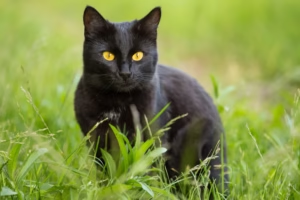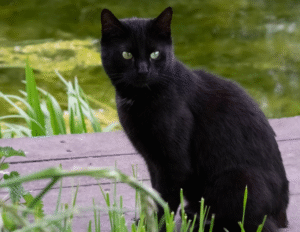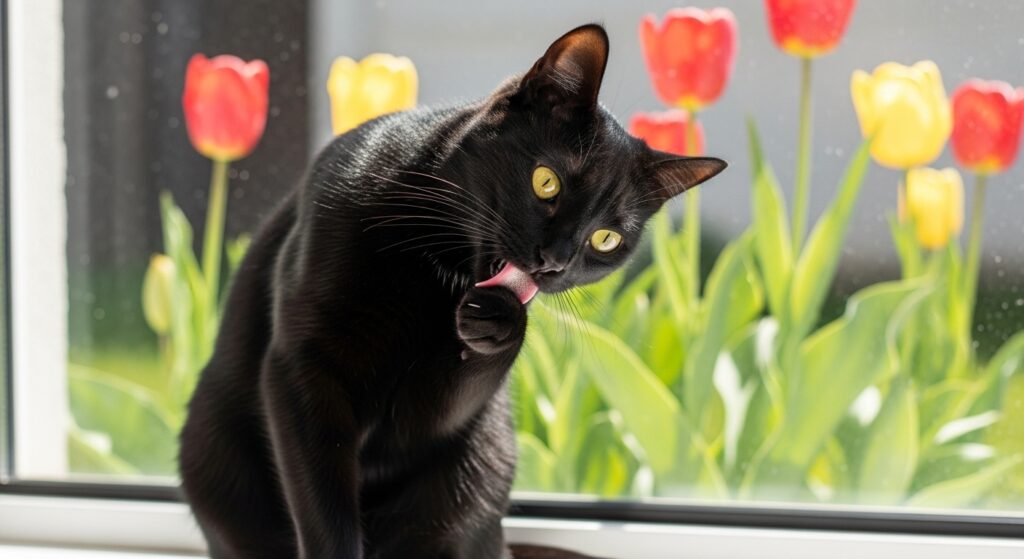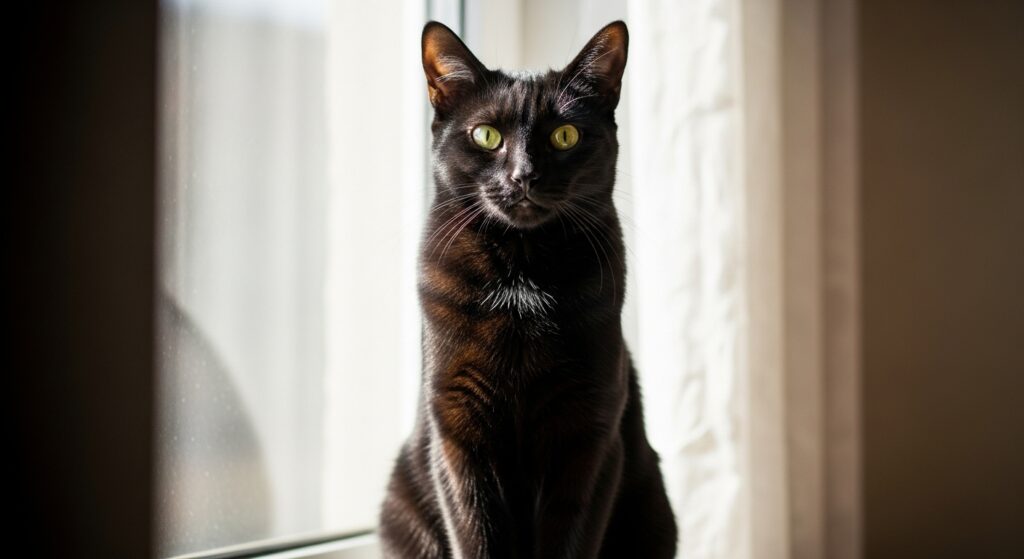Black cats have long been surrounded by myths and superstition, but in reality, they are just as lovable, playful, and loyal as cats of any other color.
Whether you’re adopting a sleek black kitty for the first time or caring for one you’ve had for years, understanding their unique needs is the key to keeping them healthy and thriving.
In this guide, we’ll share essential black cat health tips to help your feline live a long, vibrant life.

1. Schedule Regular Vet Checkups
Routine veterinary visits are the cornerstone of good cat health.
Black cats, like all cats, should have annual wellness exams to check for early signs of illness, maintain a healthy weight, and stay updated on vaccinations.
Since some health issues are hard to spot in cats, these checkups ensure problems are caught before they become serious.
Tip: Consider bi-annual checkups if your cat is a senior or has a pre-existing condition.
2. Keep Their Coat Glossy and Healthy
A shiny black coat is one of the most striking features of these cats. To keep their fur looking its best, ensure a balanced diet rich in omega-3 and omega-6 fatty acids.
Regular grooming also helps distribute natural oils and reduces shedding.
Tip: Brush your black cat at least twice a week to prevent tangles and keep their coat sleek and vibrant.
3. Protect Them from the Sun
Did you know black cats can get sunburn, especially on their ears and nose? Too much sun exposure may also increase the risk of skin cancer.
If your cat loves lounging by the window or in the yard, make sure they have access to shady spots.
Tip: Limit outdoor time during peak sun hours, or use pet-safe sunscreen on vulnerable areas if your vet recommends it.
4. Monitor Their Weight and Diet
Obesity is a common issue in cats and can lead to diabetes, joint problems, and heart disease.
Black cats may sometimes appear leaner or heavier depending on how their dark fur hides their body shape, so always check by feeling their ribs and waistline rather than relying on appearance alone.
Tip: Stick to portion-controlled meals and avoid overfeeding treats. High-quality protein-based cat food works best.
5. Keep Them Safe Indoors
Unfortunately, black cats face a higher risk of harm outdoors due to superstition and accidents.
Many shelters even pause black cat adoptions around Halloween to protect them.
Keeping your black cat indoors is one of the best ways to ensure their safety and longevity.
📱 Join Our WhatsApp Pet Channel
Get daily ideas, pet tips, and exclusive pet stylish deals — straight to your phone. Don’t miss out!
👉 Join NowTip: Provide enrichment with scratching posts, climbing trees, and interactive toys to keep your indoor black cat stimulated and happy.

6. Prioritize Dental Care
Dental health often goes unnoticed, but poor oral hygiene can lead to gum disease, pain, and systemic health problems.
Regular brushing, dental treats, or vet-approved rinses can keep your black cat’s teeth in great condition.
Tip: Start brushing your cat’s teeth gradually with a pet-safe toothbrush and flavored toothpaste to build comfort.
Read More: Indoor Rabbit Cage Ideas
7. Look Out for Subtle Health Signs
Because of their dark fur, it can be harder to notice certain changes like skin issues, small injuries, or lumps on black cats.
Regularly check their skin, paws, and ears to ensure everything looks healthy.
Tip: Run your hands gently along their body during grooming sessions to feel for bumps, cuts, or unusual patches.
8. Give Them Love and Mental Stimulation
Mental health is just as important as physical health. Black cats are intelligent and affectionate, and they thrive when given attention and playtime.
Puzzle feeders, laser toys, and even teaching simple tricks can enrich their lives.
Tip: Dedicate at least 15–20 minutes daily for interactive play to strengthen your bond and keep your cat mentally sharp.
Black Cat Health FAQs
1. Do black cats need special care compared to other cats?
No, black cats do not need unique health care compared to other breeds or coat colors. However, their dark fur can make it harder to notice injuries or skin issues, so regular hands-on checks and grooming are extra important.
2. Are black cats more prone to health problems?
There’s no evidence that black cats are more prone to illnesses than cats of other colors. In fact, some studies suggest the genetics behind black fur may even provide resistance to certain diseases.
3. Can black cats go outside safely?
While some cats enjoy outdoor time, black cats face additional risks due to superstition and being harder to see at night. It’s generally safer to keep them indoors or let them enjoy secure outdoor enclosures.
4. How can I make my black cat’s coat shinier?
A diet rich in omega-3 fatty acids, regular grooming, and proper hydration can make their black fur look glossy and healthy. Occasional brushing helps distribute natural oils for extra shine.
5. Why are black cats harder to photograph?
Their dark coats absorb light, making details less visible in photos. To capture their beauty, try photographing them in natural light or against a lighter background.

Final Thoughts
Black cats may be shrouded in myths, but in truth, they’re just as deserving of love and care as any other feline.
With regular vet care, a nutritious diet, safe indoor living, and plenty of affection, your sleek companion will enjoy a long, healthy, and happy life.
Following these black cat health tips not only ensures their well-being but also celebrates the beauty and magic they bring to your home every day.
📱 Join Our WhatsApp Pet Channel
Get daily ideas, pet tips, and exclusive pet stylish deals — straight to your phone. Don’t miss out!
👉 Join Now
